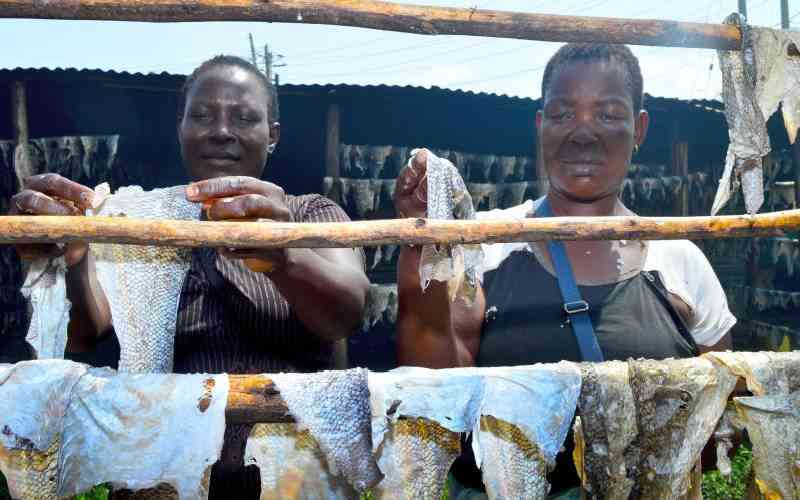
At the crack of dawn, the tranquil shores of Lake Victoria come alive with the bustling energy of the 'Obunga Dry Fish Women,' a group of 17 enterprising women from the Obunga slums in Kisumu.
For five years, they have been selling fish, but their journey took a remarkable turn when they discovered a unique way to not only increase their income but also contribute to environmental conservation.
"We realised we can increase our income from fish waste," said Millicent Oranga, a member of the group.
With fish skin, bones, and scales posing an environmental menace, the women approached a fish fillet processing plant, which gladly started supplying them with fish waste.
The women then got to work, sorting sacks of fish waste, scaling, fleshing fish skin, and making sure no valuable material went to waste.
What began as an entrepreneurial endeavor soon turned into a sustainable venture.
The women collect fresh fish waste, including skin and bones, which they skillfully smoke and dry before grinding with a milling machine.
Dr Isabel Asamba, an environmentalist at Maseno University, praised the women's efforts, emphasising the nutritious quality of the animal feeds they produce from the fish waste.
These feeds boost the productivity and health of chicks, piglets, and calves, offering both environmental and economic benefits.
"Fish leftovers and their processing byproducts represent a significant portion of the original fish, and their disposal has a high environmental and economic impact," explains Dr Asamba.
Not stopping at animal feeds, the women found another way to maximise their gains.
The skin from larger Nile Perch is taken to the Kenya Industrial Research and Development (KIRDI), where it undergoes tanning and treatment to produce durable leather, ideal for making footwear, handbags, and other products.
"We have found a better and more suitable way of utilising fish wastes and earning profits rather than discarding them," says Dr Oranga, beaming with pride.
Nile Perch is abundant in Lake Victoria, accounting for 70 per cent of the total fish catch.
Fish factories around Kisumu produce approximately 150,000 tonnes of fish waste annually, primarily from Nile perch fillets exported to European countries.
The women's group purchases 100 kilogrammes of Nile perch skins from the fillet processing plant at Sh1,220 and, after producing the animal feeds, they make up to Sh6,000.
One kilo of fish scales goes for Sh10, and once ground, it costs Sh60. Consequently, the group has doubled its income margins and can easily make over Sh10,000 in profits per week from animal feeds.
"The fish waste is a blessing, and we utilise it to the maximum; indeed, it's a blessing in disguise," said Dorothy Atieno, another member of the group. The women are even resourceful with fish intestines, which they boil and use as chicken feeds.
However, the decreasing amount of fish stock has emerged as a major challenge for the 'Obunga Dry Fish Women.' During drought seasons, the limited fish supply affects their operations and profits.
"At such times, there is little fish in supply, and we suffer because of the limited availability," lamented Atieno.
The women call for relevant authorities to establish multiple fish filleting plants in lakeside cities, to ensure a stable supply of fish waste for their thriving business.
Eunice Achieng, a member of the group, believes that with support from the fisheries department and the Kisumu County government, incorporating modern technology for efficiency and increased production of the feeds from fish skin, bones, and scales is possible.
This would enable the group to achieve even greater success and impact.
Statistics from the Kenya Marine and Fisheries Research Institute (KMFRI) paint a concerning picture of dwindling fish stocks in Lake Victoria.
In the last 50 years, Lake Victoria's annual Tilapia production has declined from about 60,000 metric tonnes to a meager 20,000 tonnes.
On the other hand, the resilient Nile Perch can produce 17 million eggs per fish, whereas Tilapia only lays 300 eggs.
Despite this advantage, Nile Perch has also suffered a decline, dropping from about 340,000 metric tonnes a decade ago to approximately 200,000 metric tonnes today.
Dr Chrisphine Nyamweya, assistant director at KMFRI, attributes the shrinking fish stocks to overfishing and illegal fishing practices.
"Stocks of Nile Perch have really declined, and getting very big fish to enable fishmongers to get large skins has been a great challenge," said Dr Nyamweya.
Despite the challenges, the 'Obunga Dry Fish Women' remain committed to their noble cause of turning fish waste into profits while contributing to environmental preservation.
With determination and support from relevant authorities, their shining example of entrepreneurship and sustainability could pave the way for a brighter future for Lake Victoria and its surrounding communities.
 The Standard Group Plc is a multi-media organization with investments in media
platforms spanning newspaper print
operations, television, radio broadcasting, digital and online services. The
Standard Group is recognized as a
leading multi-media house in Kenya with a key influence in matters of national
and international interest.
The Standard Group Plc is a multi-media organization with investments in media
platforms spanning newspaper print
operations, television, radio broadcasting, digital and online services. The
Standard Group is recognized as a
leading multi-media house in Kenya with a key influence in matters of national
and international interest.











